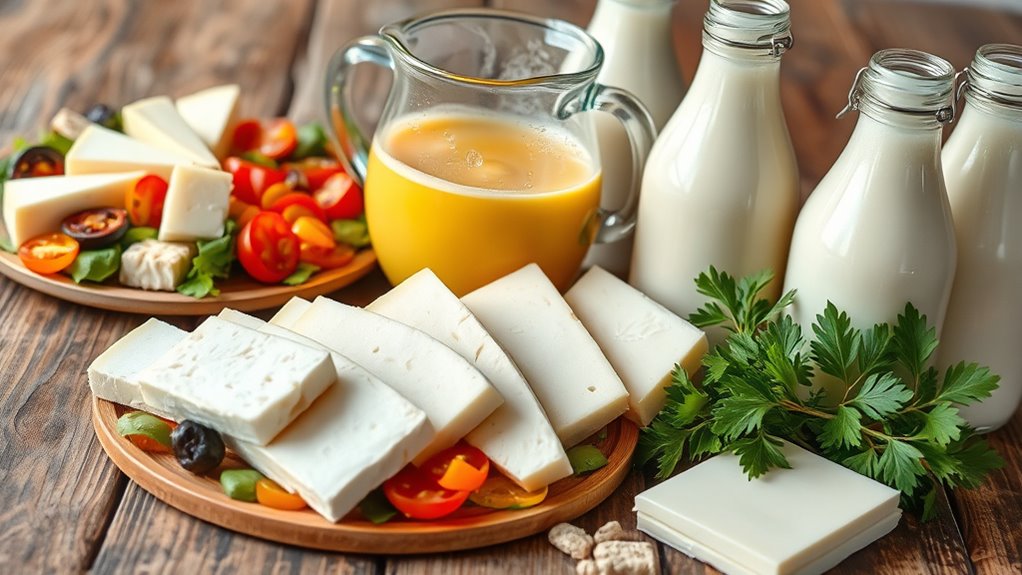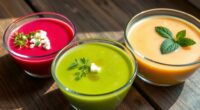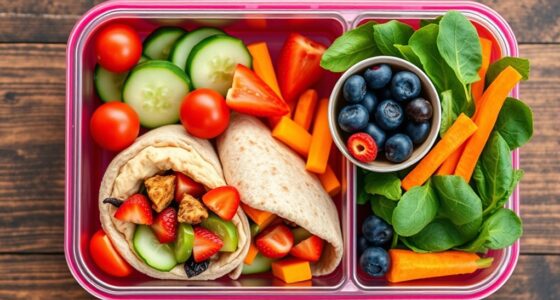Dairy foods like milk, cheese, and yogurt play an important role in vegetarian diets by providing essential nutrients such as calcium, protein, and vitamin B12 that can be harder to get from plant sources alone. They support your bone health, muscle function, and overall nutrition. If you want to explore how to balance dairy intake or find suitable alternatives, you’ll find plenty of helpful tips and options ahead.
Key Takeaways
- Dairy provides essential nutrients like calcium, protein, and vitamin B12, supporting bone health and overall nutrition in vegetarian diets.
- It serves as a convenient source of nutrients that may be difficult to obtain solely from plant-based foods.
- For those with lactose intolerance, dairy alternatives such as fortified plant-based milks help meet nutritional needs.
- Incorporating dairy or its alternatives ensures dietary diversity and helps maintain balanced nutrition.
- Personal preferences and health considerations influence whether vegetarians include traditional dairy or opt for plant-based substitutes.

Have you ever wondered how dairy fits into a vegetarian diet? For many vegetarians, dairy products like milk, cheese, and yogurt are essential sources of nutrients such as calcium, protein, and vitamin B12. These nutrients are crucial for maintaining bone health, supporting muscle function, and preventing deficiencies. Incorporating dairy can be straightforward if you’re comfortable with traditional options, but it gets complicated if you have lactose intolerance or prefer to avoid animal products altogether. Lactose intolerance, which is common among adults, makes digesting dairy difficult because your body lacks enough lactase enzyme to break down lactose—the sugar found in milk. If you experience bloating, gas, or stomach cramps after consuming dairy, you might need to explore dairy alternatives.
Fortunately, there’s a wide range of dairy alternatives available today. Plant-based milks like almond, soy, oat, and coconut milk are popular options that mimic the texture and flavor of cow’s milk. These alternatives are often fortified with calcium, vitamin D, and B12, ensuring you don’t miss out on essential nutrients. Some people prefer nut-based cheeses or coconut yogurt as substitutes for traditional dairy cheese and yogurt, offering similar taste and texture while aligning with vegetarian or vegan lifestyles. When choosing dairy alternatives, it’s important to check labels for added sugars and preservatives, opting for unsweetened or minimally processed options to maintain a healthy diet. Additionally, advancements in food technology have led to plant-based dairy options that closely resemble traditional products in taste and nutrition.
For vegetarians who consume dairy without issues, incorporating it can be as simple as adding a splash of milk to your cereal or using cheese in sandwiches and salads. Dairy products are versatile, and you might find that they help diversify your meals and make it easier to meet your nutritional needs. If you’re lactose intolerant or trying to reduce dairy consumption, you can experiment with fortified plant-based options that provide comparable nutrients. Many brands now offer fortified plant-based yogurts and cheeses specifically designed for people with lactose intolerance or dairy allergies, making it easier to enjoy familiar flavors without discomfort.
Ultimately, whether you choose to include dairy in your vegetarian diet or rely on dairy alternatives, it’s about balancing your nutritional needs with your ethical or health considerations. Understanding your body’s response to dairy and exploring the variety of available options can help you craft a diet that’s both satisfying and nourishing. With so many choices today, you don’t have to compromise on taste or nutrition, even if you’re avoiding traditional dairy products.
Frequently Asked Questions
Can Vegetarians Get Enough Calcium Without Dairy?
Yes, you can get enough calcium without dairy. Focus on calcium sources like leafy greens, fortified plant milks, tofu, and almonds. Incorporate these into your diet regularly. If needed, consider vegan supplements to guarantee you meet your daily calcium needs. Tracking your intake helps, and consulting a healthcare professional can provide personalized guidance for maintaining strong bones without dairy.
How Does Dairy Affect a Vegetarian’s Environmental Footprint?
Dairy’s impact on your environmental footprint is like adding a splash of complexity to an already intricate tapestry. It increases your carbon footprint and resource consumption, as dairy farming demands significant land, water, and energy. By choosing plant-based alternatives, you can reduce these impacts, making your vegetarian lifestyle more sustainable. Every dairy product you cut down helps you tread more lightly on the planet’s delicate balance.
Are There Ethical Concerns With Dairy Consumption for Vegetarians?
Yes, you might have ethical concerns with dairy consumption as a vegetarian. Many worry about animal rights and the treatment of dairy cattle, especially in factory farming conditions. You could feel conflicted knowing that some dairy practices involve confinement, invasive procedures, and early separation of calves from mothers. If animal welfare matters to you, exploring ethically sourced dairy or plant-based alternatives helps align your diet with your values.
What Are the Best Dairy Alternatives for Vegetarians?
Imagine a world where your pantry overflows with delicious plant-based milks like almond, soy, and oat, transforming every drink and recipe into a creamy delight. Nutritional yeast becomes your secret weapon, adding cheesy flavor and essential nutrients without dairy. These alternatives are perfect for vegetarians, providing rich taste and nutrition while aligning with ethical choices. Embrace plant-based milks and nutritional yeast for a dairy-free, flavorful lifestyle.
How Does Dairy Consumption Impact Vegetarian Health and Wellness?
Dairy consumption can boost your health by enhancing nutrient absorption, especially calcium and vitamin D, essential for bone health. It also supports immune health due to probiotics and bioactive compounds. However, some individuals may experience sensitivities or allergies, so balancing dairy intake with other nutrient sources is key. Moderation and choosing high-quality, organic options can help you maximize benefits while minimizing potential drawbacks.
Conclusion
Incorporating dairy into your vegetarian diet is like adding a splash of color to a black-and-white canvas—it enriches your meals with essential nutrients and variety. Dairy provides crucial protein, calcium, and vitamins that help you maintain a balanced, healthy lifestyle. By embracing dairy, you make your vegetarian journey more complete, ensuring your body gets what it needs. So, think of dairy as the bridge that connects your plant-based choices to overall wellness.









